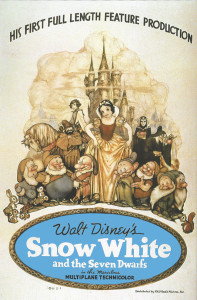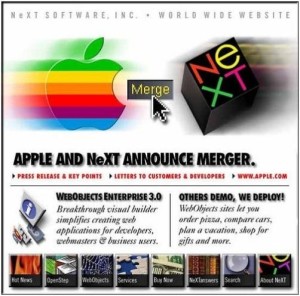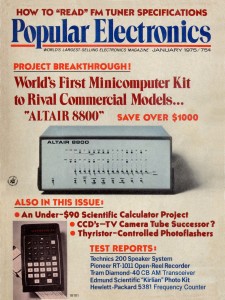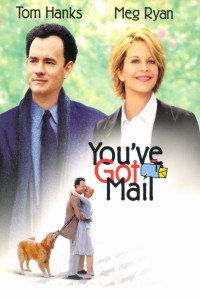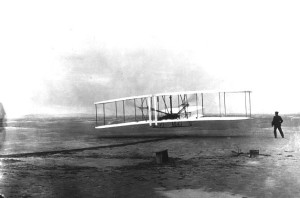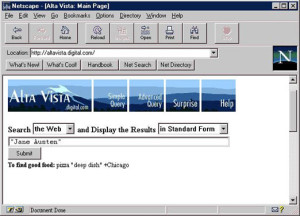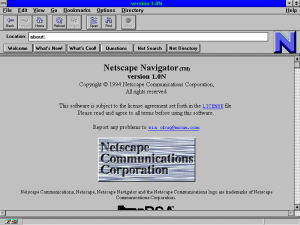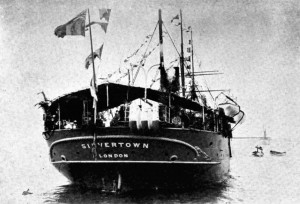Snow White Premieres
Walt Disney premiers the animated film Snow White and the Seven Dwarfs. It was the first full-length animated feature film taking 3 years and nearly $1.5 million to produce, a massive amount for a feature film in 1937. Walt Disney had to mortgage his house to help finance the film.
Apple Announces Purchase of NeXT
In a surprise move at the time, Apple Computer Inc. announces their intention to purchase Steve Jobs’ company, NeXT, and bring Steve Jobs on board as an advisor to CEO Gil Amelio. The purchase was completed on February 4th of the next year and brought with it the core technology that formed the basis of the future Mac OS X operating system, which itself is the foundation of the iOS operating system that runs the iPhone, iPad, and iPod Touch. Along with the leadership of future CEO Steve Jobs, the resurgence of Apple in the 2000’s and the emergence of The New World of Technology can be traced back to this major event in technology history.
Altair 8800 Goes on Sale; Inspires PC Era
Micro Instrumentation and Telemetry Systems, otherwise known as MITS, begins selling the Altair 8800 microcomputer kit. As the base computer used toggle switches for input and LEDs for output, it was far from a personal computer as we know it today. However, it is one of the most important computers in history, for it inspired the first generation of entrepreneurs that created the personal computer industry. After the Altair 8800 appeared on the cover of Popular Electronics magazine in December of 1974 for the January 1975 issue, MITS was flooded with orders. Expecting to sell at most 800 units, MITS sold over 5,000 units by August of 1975. A young Bill Gates and Paul Allen, excited by the possibility of small computers that could be used in the home, wrote the BASIC programming language for the Altair, their first software product which formed the basis of their future company, Microsoft. The Altair was also popular with the Homebrew Computing Club, where Steve Wozniak and Steve Jobs began their partnership selling their own computer kit, the Apple I.
The Internet Goes Hollywood
The Warner Brothers motion picture You’ve Got Mail, starring Tom Hanks and Meg Ryan, is released to theaters. While mostly known as a romantic comedy, the film was chock-full of technology symbolism. Primarily I find interesting that the movie’s themes of business and technology was foreshadowing larger changes to come.
Starting with the obvious, the film’s title was the popular notification sound used by AOL for incoming e-mail. This showed just how quickly the Internet had become mainstream with e-mail and on-line dating starting to gain traction in the general population. At the time, AOL was the face of the Internet to those just getting their feet wet. However, it also foreshadowed one of the biggest technology deals in history. Just a little over a year later AOL would buy Warner Brothers’ parent company Time Warner, forming one of the largest media companies in history. However, the dot-com bubble burst and the merged companies never quite meshed. AOL was eventually spun-off in 2009, having lost its status in a more tech-evolved society.
Additionally, the main characters’ choice of technology was telling. Tom Hank’s character, the corporate businessman, used a Windows-based PC (an IBM no less) while Meg Ryan’s character, the small book shop owner, used a Macintosh Powerbook. The common thinking at the time was that Windows PCs were for business and Macintosh computers were for “creative” people. Of course, this was just a few years before the iPod was introduced and Apple re-revolutionized the technology industry in the 2000’s. Apple is now the consumer face of technology, whereas Windows is past its heyday even among many business professionals.
The book industry was highlighted, with the movie’s subplot exploring the struggle of small businesses against the expansion of large corporate chains. Yet in the span of about a decade after the movie was released, large corporate bookstores were on the defensive against upstart companies doing business on the Internet. For context, in 1998 after 3 years in business, Amazon.com had yet to turn a profit, yet today Borders is out of business. The rise of social media now gives small companies the ability to effectively market themselves directly to their customer base, giving them a way to compete with large corporations. All this in a relatively short time after a movie helped publicize a computer network.
Perl is Always Appropriate
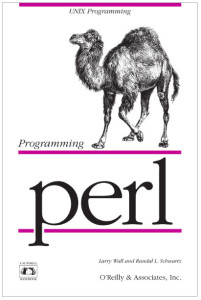
The O’Reilly book, Programming Perl, was released in 1991. It became known as the “Camel Book” among Perl programmers and the camel became the unofficial logo for the Perl programming language.
December 18, 1987
Larry Wall releases version 1.0 of Perl, a general-purpose programming language very commonly used as a Unix scripting language. Perl became very popular on the early world wide web, commonly being used to program CGI scripts for web applications. Perl’s flexibility and adaptability continues to make it a widely used programming language to this day.
Wright Brothers First Powered Flight
Orville and Wilbur Wright make their famous first controlled and sustained flights with a heavier than air, powered aircraft. Orville made the very first flight which lasted about 12 seconds. Three more flights were made that day by both brothers, with the most successful being the fourth and final flight in which Wilbur flew for 59 seconds. The work done by the Wright brothers helped spawn the aviation industry.
Canning Spam

The CAN-SPAM Act of 2003 is signed into United States law. Passed in an attempt to control the growing deluge of junk e-mail, the law’s effectiveness is dubious at best, especially considering political spam is exempt from the law.
AltaVista Launches
Developed by researchers at Digital Equipment Research Laboratories, the AltaVista search engine is launched. It was the first world wide web search service to gain significant popularity. One of the most popular search engines in the early world wide web, Google didn’t overtake AltaVista until 2001. AltaVista was eventually purchased by Yahoo! in 2003.
Netscape 1.0 Released
Netscape Communications Corporation releases Netscape Navigator 1.0, the world’s first commercially developed web browser, although this particular version was free for non-commercial use.
The First Transpacific Telegraph Cable
The cable ship Silvertown begins laying the first Transpacific telegraph cable from San Francisco, destined for Honolulu, Hawaii. After laying 2,238 nautical miles of cable, the Silvertown will land in Honolulu on December 26th. On January 1, 1903 the connection between Hawaii and San Francisco was established. Public messages will begin transmitting on January 5.

